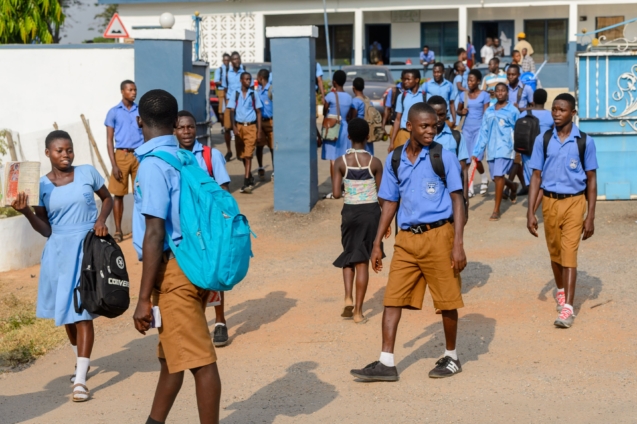There is sweeping reforms to the Senior High School system as government commences the implementation of a new curriculum on Monday, November 4.
Government says the changes are to focus on building character development and holistic education to create well-rounded, ready-for-the-world students.
The new curriculum also takes over from the existing system with students now required to do a minimum of seven and a maximum of nine learning areas in school.
In an interview with JoyNews, the acting head of Curriculum Development at the National Council for Curriculum Assessment (NaCCA), Reginald Quartey explaining why this change is necessary noted that the new curriculum is expected to shape learners since the 21st century skill and competence is being integrated to be able to develop values.
“The curriculum is not only looking at what we call the cognitive domain but we are also looking at the behavioral and social domains including values. We were thinking that this curriculum should be as such that after learners have through this curriculum a number of years, you will be able to major based on the kind of things you see in our society,” he explained.
The major changes include grouping specific learning areas into four groups with students at liberty to choose subjects that were not included in the original courses.
Director General of NaCCA, Professor Yayra Dzakadzie explained this new system with General Science as a case study.
“The curriculum is organized into four groups: A, B, C, and D. Group A includes core subjects mandatory for all learners. For science students, core science is replaced by dedicated courses in physics, chemistry, and biology.
"Group C offers subjects related to specific learning areas, such as additional mathematics, food and nutrition, and electronics. Science students may take courses from Group C to broaden their studies. Group D provides options outside the core science focus, including economics, religion, history, and Ghanaian languages, allowing students to explore additional interests. However, students are limited to a maximum of nine subjects for program completion.”
Prof Yayra Dzakadzie added that significant and extensive engagement has been done with all stakeholders before this implementation.
Latest Stories
-
AG moves to strike out suspended CJ’s fresh challenge to removal petition
4 minutes -
Over 200 prophecies submitted since national directive – Presidential Envoy reveals
20 minutes -
Samson Lardy Ayenini to speak at CoMSSAFest 2025 seminar
34 minutes -
Justice Oppong recalled to the bench as Prof Atuguba takes over Ghana School of Law
38 minutes -
Stronger legislation needed for forensic, DNA testing – Expert
41 minutes -
Defamation case: Lawyer for Dua Agyeman cross examines GTEC official
43 minutes -
Three arrested in Accra over possession, manufacture of illegal guns
54 minutes -
Our father is irreplaceable – Omane Boamah’s children pay emotional tribute at vigil
1 hour -
‘Daddy, why did you leave so soon?’ – Omane Boamah’s children mourn
1 hour -
Akufo-Addo pays tribute to late Asantehemaa Nana Konadu Yiadom III
1 hour -
UN-Habitat partners with Anloga District to protect coastal towns from climate threats
2 hours -
Prices of petrol and LPG to go up; Diesel to fall from August 16
2 hours -
AfricaHPO, MoE, and GES launch innovative anti-bullying and mental health drive in Ghana’s schools
2 hours -
Ghana Mineworkers’ Union raises red flag over casualisation in mining sector, urges gov’t to act
2 hours -
Prince Adu-Owusu: When a quiet love finally spoke
3 hours

